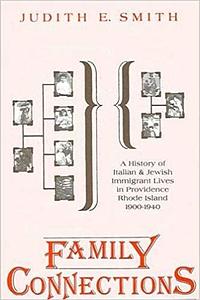Take a photo of a barcode or cover
Just as much history as it is sociology, Judith Smith argues that the relationship between ethnicity and class in Providence was transformed during the years at hand. In large part, this is because of differing visions of "family" by members of a family. Although there is some sense of consensus on what "family" is (especially when connected to kinship), all members of a family have separate roles, and burdens of support/access to resources may be limited for some individuals while granted to others. In the case of the nuclear family, this is true for relationships between a father and a mother, but the sense of difference is magnified for children.
As a result, second-generation immigrants experienced a world made by both their parents and changing economic circumstances. In turn, they then revised the meaning of what family is. Sharing a generational lens, these children were often more similar to one another than they were to the parents' generation, and they reshaped their communities accordingly. Over time, patriarchal authority weakened, as did connections with extended family and members of the community.
Smith doesn't say it outright, but this seems to fit almost in an assimilationist model of integration, which becomes "Americanized" over time. I'm not convinced by the utility of assimilation as a social force, let alone it being something that all immigrants experience or should be forced to experience, but Smith's evidence does seem to lean in that direction. That said, while I don't love sociology, this is an important contribution to the literature and it helps reshape the way I think of family.
As a result, second-generation immigrants experienced a world made by both their parents and changing economic circumstances. In turn, they then revised the meaning of what family is. Sharing a generational lens, these children were often more similar to one another than they were to the parents' generation, and they reshaped their communities accordingly. Over time, patriarchal authority weakened, as did connections with extended family and members of the community.
Smith doesn't say it outright, but this seems to fit almost in an assimilationist model of integration, which becomes "Americanized" over time. I'm not convinced by the utility of assimilation as a social force, let alone it being something that all immigrants experience or should be forced to experience, but Smith's evidence does seem to lean in that direction. That said, while I don't love sociology, this is an important contribution to the literature and it helps reshape the way I think of family.

